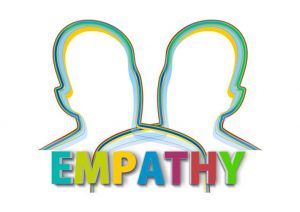
Do people with Autism Spectrum Disorder feel empathy for others? I have written about this question several times and my answer remains YES. Empathy is as much a part of having ASD as it is for any normal person. It’s just harder to see.
I raise this topic again for two reasons. Many people believe that the social awkwardness characteristic of Autism Spectrum Disorder has to do with an inability to understand and share the feelings of others. I happen to believe this is not true. Instead, it is my experience that adults with ASD are focused on their own thoughts and feelings and, hence, pay less attention to those of other people. When prompted or when circumstances push them to, however, they are capable of identifying and paying attention to other people’s feelings. While empathy does not come naturally, those with Autism have the same emotions as anyone else and they can respond to other people’s feelings if they want to.
The other reason why I emphasize the point about empathy is to suggest a way to work with the manner of responding to feelings that is characteristic of Autism. My advice, basically, is to act as a teacher, teaching a student the skill of paying attention to you. As I said, people with Autism Spectrum Disorder are capable of identifying and responding to feelings but they typically do not know what to do with those feelings. Like social proficiency in general, empathic behavior is developed and refined step by step through repetition, practice, and guidance. I will say more about this in a moment.
Is Empathy Possible in Autism Spectrum Disorder?
As the title of this article suggests, there is a wide difference between how we think of empathy in neurotypical, or normal, people and those with Autism Spectrum Disorder. Because the main problem of people with ASD is an inward rather than an outward focus, they are preoccupied with what is going on within themselves rather than what is happening in other people. That is why, for example, their conversations not only tend to be about their own interests and views but also lack a typical understanding of the interests, views and emotional state of the person or persons they are speaking to.
This means two things. As I said earlier, what appears to be a lack of empathy is instead a lack of awareness of how other people feel, caused by the persistent Autism focus, from early in life, on oneself. Empathy is not absent. Rather, it is underdeveloped.
The second, and more practical, implication of this view of empathy is that it is a skill that can grow and evolve, approaching in many cases what we would consider normal. Empathy is not something you either have or you don’t. It can be developed with patience and perseverance and recognition of the fact that, like other proficiencies, it can be learned.
How can empathy be learned? By first committing to becoming empathic. Motivation to accomplish something is always the key to success. It then takes studying the components of empathy, making sure they are understood thoroughly and committed to memory, like chords on the piano or the steps in solving a mathematical equation. Practice and repetition are the next, and crucial, steps in the process.
Furthermore, accepting feedback on how well the learning process is going matters enormously, as do attempts to correct mistakes and an ongoing effort to assess what works and what doesn’t.
Depending upon how difficult it is to understand and feel what another person is experiencing, and to place oneself in another’s position, developing the skill of empathy can take a long or relatively short period of time. What is most important, however, is that one is faithful to the concept that empathy can be learned. With this firmly in mind, empathy can be achieved in adults with Autism Spectrum Disorder.
